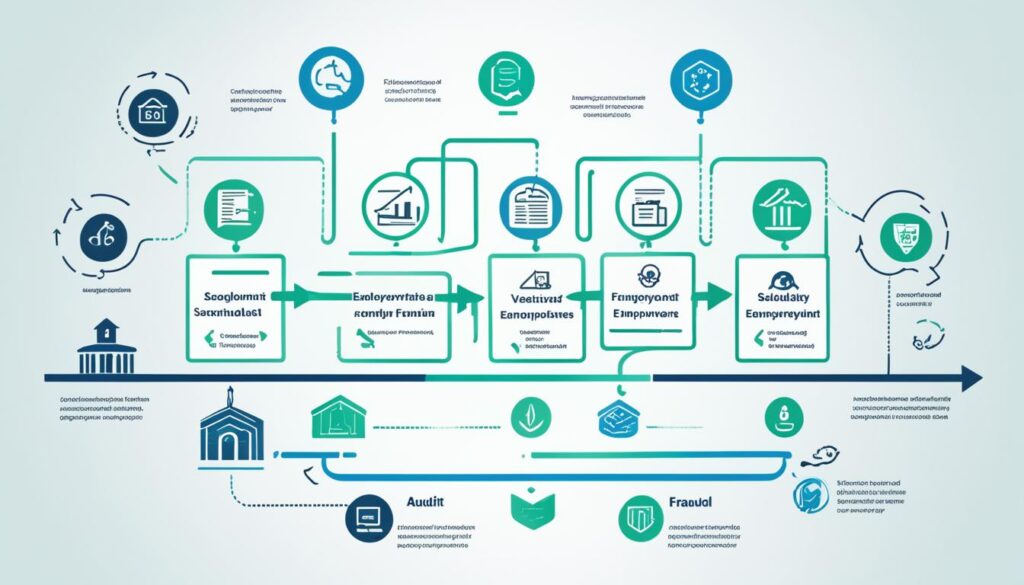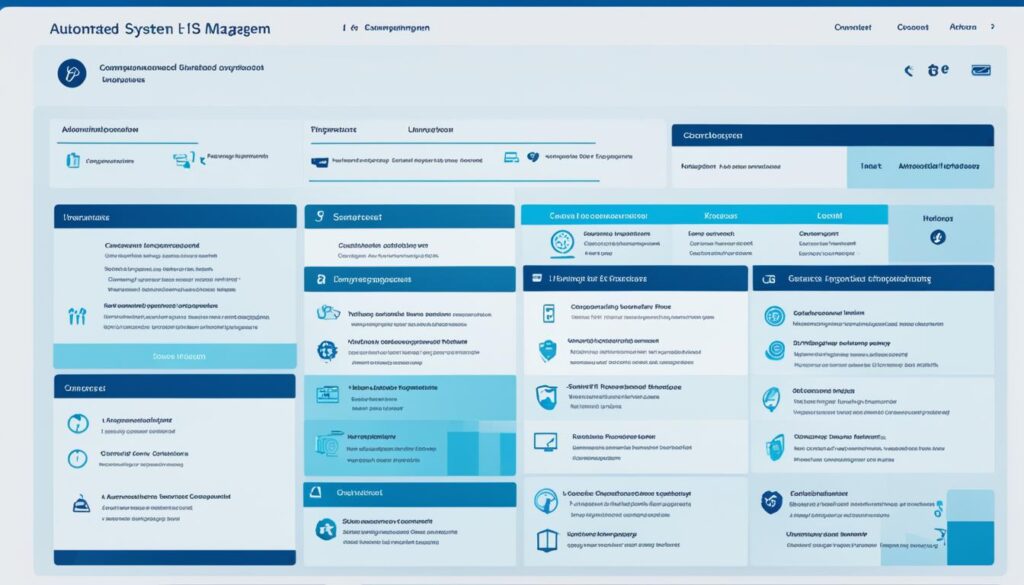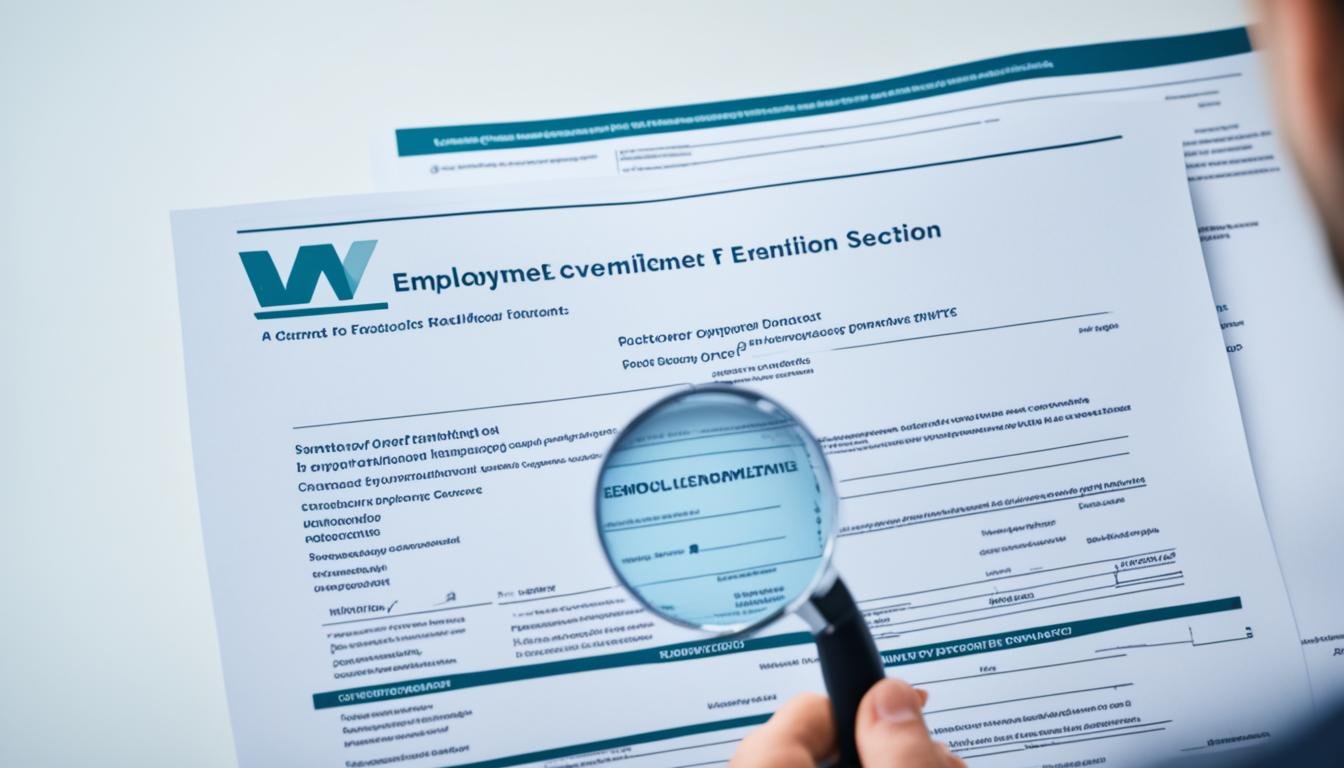Did you know that a staggering 95% of employers have encountered some form of resume fraud during the hiring process? This startling statistic underscores the critical importance of employment verification in safeguarding your business from hiring risks, legal implications, and fraudulent activities. As a responsible employer, ensuring accurate workforce compliance is a vital aspect of your recruiting process.
The Employment Eligibility Verification Form I-9 is a federal requirement for all new hires in the United States. This form plays a crucial role in verifying the identity and work authorization of your employees, helping you maintain compliance with immigration laws. Properly completing and retaining I-9 forms is essential to avoiding penalties and mitigating the legal risks associated with unauthorized employment.
Key Takeaways
- Employment verification is critical for safeguarding your business from hiring risks, legal implications, and fraudulent activities.
- The Form I-9 is a federal requirement that verifies the identity and work authorization of new hires, ensuring workforce compliance with immigration laws.
- Properly completing and retaining I-9 forms is essential for avoiding penalties and mitigating legal risks associated with unauthorized employment.
- Thorough employment verification promotes a fair and secure hiring process, ensuring you only onboard legally authorized workers.
- Automating the I-9 verification process can streamline your onboarding procedures and enhance compliance, especially for remote hires.
Ensuring Workforce Compliance
As an employer, maintaining a compliant workforce is essential for the success and longevity of your business. At the heart of this compliance lies the Form I-9, a crucial tool for verifying the employment eligibility of new hires. By properly completing the I-9 process, you can ensure your workforce is authorized to work in the United States, upholding your obligations under immigration laws.
Verifying Employment Eligibility with Form I-9
The Form I-9 requires each new employee to complete Section 1 on their first day of work, providing information about their identity and work authorization status. As the employer, you must then review original documents presented by the employee that establish their identity and authorization to work in the U.S. This thorough verification process helps you comply with federal regulations and maintain a workforce that is legally eligible for employment.
Understanding I-9 Requirements for New Hires
Properly completing the Form I-9 is essential for ensuring your onboarding process and overall workforce compliance. By understanding the specific requirements for new hires, such as the acceptable documents for identity and work authorization verification, you can streamline the I-9 process and avoid potential issues down the line. Maintaining accurate I-9 records and regularly reviewing your compliance practices can further strengthen your commitment to a legally compliant workforce.

Safeguarding Against Fraudulent Activities
Employment verification plays a crucial role in safeguarding your business against fraudulent activities. By thoroughly validating the identity and work authorization documents presented by new hires, you can mitigate the risk of hiring individuals who are not legally authorized to work in the United States. This process of identity verification is essential for maintaining a compliant workforce and preventing potential legal issues.
Validating Identity and Work Authorization Documents
During the onboarding process, you must carefully examine the original documents provided by new hires to verify their identity and work authorization. This includes reviewing forms of identification, such as passports, driver’s licenses, and Social Security cards, to ensure they are authentic and belong to the individual. By conducting this thorough identity verification, you can prevent the hiring of individuals who may be attempting to use fraudulent documents to gain employment.
Maintaining a Detailed Audit Trail
Alongside the validation of identity and work authorization documents, it is crucial that you maintain a detailed audit trail of the I-9 compliance process. This includes properly completing and retaining the I-9 forms, as well as keeping records of the documents reviewed. Having a well-documented audit trail demonstrates your commitment to I-9 compliance and can be invaluable if your business is ever audited by the U.S. Immigration and Customs Enforcement (ICE). This audit trail serves as evidence of your diligence in preventing fraud and ensuring the work authorization of your employees.

Why Employment Verification Is Important
Proper employment verification is essential for mitigating legal risks and potential penalties associated with hiring unauthorized workers. Failing to comply with I-9 requirements can lead to steep fines and other sanctions, putting your business at significant legal and financial risk. Additionally, a thorough employment verification process promotes a fair and secure hiring process, ensuring you only onboard individuals who are legally authorized to work in the United States.
Mitigating Legal Risks and Penalties
Neglecting to properly verify the employment eligibility of new hires can expose your business to substantial legal risks and potential penalties. Non-compliance with I-9 regulations can result in hefty fines, with the U.S. Immigration and Customs Enforcement (ICE) levying penalties ranging from $252 to $2,392 per violation. Maintaining a comprehensive employment verification process is crucial to avoiding these legal risks and safeguarding your organization’s financial well-being.
Promoting a Fair and Secure Hiring Process
Beyond mitigating legal risks, a thorough employment verification process also ensures a fair and secure hiring process. By verifying the identity and work authorization of all new hires, you can be confident that you are only onboarding individuals who are legally entitled to work in the United States. This helps to maintain compliance with immigration regulations and promotes a level playing field for all applicants, regardless of their background or citizenship status.

Streamlining the Verification Process
In today’s digital landscape, streamlining the employment verification process is crucial for employers. Automating the I-9 verification process can significantly enhance your onboarding procedures and ensure seamless compliance with relevant regulations. Digital automated I-9 management solutions eliminate the need for paper forms, making the verification process more efficient and reducing the risk of errors.
Benefits of Automated I-9 Management
By leveraging automated I-9 management tools, you can simplify the verification process and ensure your organization maintains compliance with employment eligibility requirements. These digital solutions facilitate a paperless onboarding experience, allowing you to securely collect, store, and manage I-9 forms electronically. This not only streamlines the process but also minimizes the potential for data entry mistakes that can lead to non-compliance issues.
Simplifying Remote Hire Verification
The rise of remote hiring has further underscored the importance of automating the I-9 verification process. Automated systems enable a seamless and compliant remote hiring experience, allowing you to onboard new employees efficiently, regardless of their physical location. By integrating digital identity verification and document validation capabilities, these solutions facilitate a streamlined verification process that ensures your compliance with employment eligibility requirements, even for remote hires.

Conclusion
Accurate employment verification is a critical component of your hiring process, safeguarding your business from legal risks, fraudulent activities, and non-compliance with immigration regulations. By thoroughly verifying the identity and work authorization of new hires through the Form I-9 process, you can maintain a compliant workforce, promote a fair and secure hiring process, and mitigate the potential for penalties.
Leveraging automated I-9 management solutions can further streamline the verification process, especially for remote hires, ensuring a seamless and compliant onboarding experience. By prioritizing employment verification, you can safeguard your business, protect your company’s reputation, and ensure you remain in compliance with all applicable laws and regulations.
Implementing a robust employment verification system is a critical step in building a strong, reliable, and legally compliant workforce. By taking the necessary steps to verify the identity and work authorization of your new hires, you can minimize legal risks and focus on attracting and retaining the best talent for your organization.
Source Links
- https://www.lakelandtoday.ca/beyond-local/photos-spectacular-northern-lights-over-the-canadian-rockies-8734171
- https://simtel-service.de/2024/05/12/i-9-verification.html
- https://www.lakelandtoday.ca/st-paul-news/decreased-government-funding-leads-to-budgetary-challenges-for-st-paul-education-8729443


